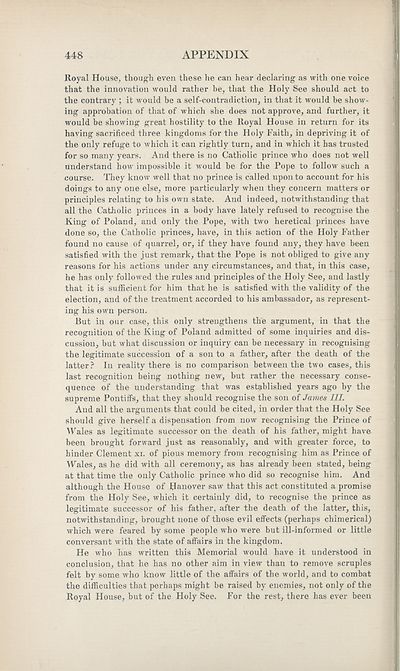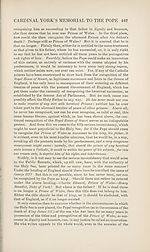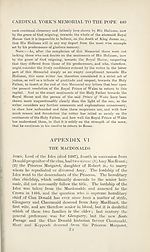Series 2 > Origins of the 'Forty-five
(545) Page 448
Download files
Complete book:
Individual page:
Thumbnail gallery: Grid view | List view

448
APPENDIX
Royal House, though even these he can hear declaring as with one voice
that the innovation would rather be, that the Holy See should act to
the contrary ; it would be a self-contradiction, in that it would be show¬
ing approbation of that of which she does not approve, and further, it
would be showing great hostility to the Royal House in return for its
having sacrificed three kingdoms for the Holy Faith, in depriving it of
the only refuge to which it can rightly turn, and in which it has trusted
for so many years. And there is no Catholic prince who does not well
understand how impossible it would be for the Pope to follow such a
course. They know well that no prince is called upon to account for his
doings to any one else, more particularly when they concern matters or
principles relating to his own state. And indeed, notwithstanding that
all the Catholic princes in a body have lately refused to recognise the
King of Poland, and only the Pope, with two heretical princes have
done so, the Catholic princes, have, in this action of the Holy Father
found no cause of quarrel, or, if they have found any, they have been
satisfied with the just remark, that the Pope is not obliged to give any
reasons for his actions under any circumstances, and that, in this case,
he has only followed the rules and principles of the Holy See, and lastly
that it is sufficient for him that he is satisfied with the validity of the
election, and of the treatment accorded to his ambassador, as represent¬
ing his own person.
But in our case, this only strengthens the argument, in that the
recognition of the King of Poland admitted of some inquiries and dis¬
cussion, but what discussion or inquiry can be necessary in recognising
the legitimate succession of a son to a father, after the death of the
latter ? In reality there is no comparison between the two cases, this
last recognition being nothing new, but rather the necessary conse¬
quence of the understanding that was established years ago by the
supreme Pontiffs, that they should recognise the son of James III.
And all the arguments that could be cited, in order that the Holy See
should give herself a dispensation from now recognising the Prince of
Wales as legitimate successor on the death of his father, might have
been brought forward just as reasonably, and with greater force, to
hinder Clement xi. of pious memory from recognising him as Prince of
Wales, as he did with all ceremony, as has already been stated, being
at that time the only Catholic prince who did so recognise him. And
although the House of Hanover saw that this act constituted a promise
from the Holy See, which it certainly did, to recognise the prince as
legitimate successor of his father, after the death of the latter, this,
notwithstanding, brought none of those evil effects (perhaps chimerical)
which were feared by some people who were but ill-informed or little
conversant with the state of affairs in the kingdom.
He who has written this Memorial would have it understood in
conclusion, that he has no other aim in view than to remove scruples
felt by some who know little of the affairs of the world, and to combat
the difficulties that perhaps might he raised by enemies, not only of the
Royal House, but of the Holy See. For the rest, there has ever been
APPENDIX
Royal House, though even these he can hear declaring as with one voice
that the innovation would rather be, that the Holy See should act to
the contrary ; it would be a self-contradiction, in that it would be show¬
ing approbation of that of which she does not approve, and further, it
would be showing great hostility to the Royal House in return for its
having sacrificed three kingdoms for the Holy Faith, in depriving it of
the only refuge to which it can rightly turn, and in which it has trusted
for so many years. And there is no Catholic prince who does not well
understand how impossible it would be for the Pope to follow such a
course. They know well that no prince is called upon to account for his
doings to any one else, more particularly when they concern matters or
principles relating to his own state. And indeed, notwithstanding that
all the Catholic princes in a body have lately refused to recognise the
King of Poland, and only the Pope, with two heretical princes have
done so, the Catholic princes, have, in this action of the Holy Father
found no cause of quarrel, or, if they have found any, they have been
satisfied with the just remark, that the Pope is not obliged to give any
reasons for his actions under any circumstances, and that, in this case,
he has only followed the rules and principles of the Holy See, and lastly
that it is sufficient for him that he is satisfied with the validity of the
election, and of the treatment accorded to his ambassador, as represent¬
ing his own person.
But in our case, this only strengthens the argument, in that the
recognition of the King of Poland admitted of some inquiries and dis¬
cussion, but what discussion or inquiry can be necessary in recognising
the legitimate succession of a son to a father, after the death of the
latter ? In reality there is no comparison between the two cases, this
last recognition being nothing new, but rather the necessary conse¬
quence of the understanding that was established years ago by the
supreme Pontiffs, that they should recognise the son of James III.
And all the arguments that could be cited, in order that the Holy See
should give herself a dispensation from now recognising the Prince of
Wales as legitimate successor on the death of his father, might have
been brought forward just as reasonably, and with greater force, to
hinder Clement xi. of pious memory from recognising him as Prince of
Wales, as he did with all ceremony, as has already been stated, being
at that time the only Catholic prince who did so recognise him. And
although the House of Hanover saw that this act constituted a promise
from the Holy See, which it certainly did, to recognise the prince as
legitimate successor of his father, after the death of the latter, this,
notwithstanding, brought none of those evil effects (perhaps chimerical)
which were feared by some people who were but ill-informed or little
conversant with the state of affairs in the kingdom.
He who has written this Memorial would have it understood in
conclusion, that he has no other aim in view than to remove scruples
felt by some who know little of the affairs of the world, and to combat
the difficulties that perhaps might he raised by enemies, not only of the
Royal House, but of the Holy See. For the rest, there has ever been
Set display mode to:
![]() Universal Viewer |
Universal Viewer | ![]() Mirador |
Large image | Transcription
Mirador |
Large image | Transcription
Images and transcriptions on this page, including medium image downloads, may be used under the Creative Commons Attribution 4.0 International Licence unless otherwise stated. ![]()
| Scottish History Society volumes > Series 2 > Origins of the 'Forty-five > (545) Page 448 |
|---|
| Permanent URL | https://digital.nls.uk/126865731 |
|---|
| Attribution and copyright: |
|
|---|
| Description | Over 180 volumes, published by the Scottish History Society, containing original sources on Scotland's history and people. With a wide range of subjects, the books collectively cover all periods from the 12th to 20th centuries, and reflect changing trends in Scottish history. Sources are accompanied by scholarly interpretation, references and bibliographies. Volumes are usually published annually, and more digitised volumes will be added as they become available. |
|---|


